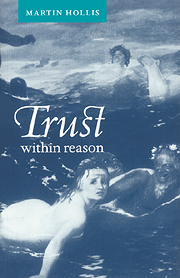2 - The perils of prudence
Published online by Cambridge University Press: 06 January 2010
Summary
This chapter will tackle the modern problem of the first by giving it a historical setting while the next chapter will provide a contemporary one. But we need to start with a plan for the whole book. The next section sets out accordingly.
plan of the book
The opening chapter began with recent ideas of rational action and where they are heading. Then it set them in an older context of Enlightenment hopes and fears, prompted by plausible doubts about the problem of trust. Straight ahead lies a simple treatment of rational action as the pursuit of any end in an instrumental way, with or without a further claim that questions about ends are simple too. This will fail, however, if ends are ambiguous in ways affecting their rational pursuit. There are three possibilities. The simplest is that each of us can do as we think best for ourselves, provided that we do what suits us all. But this may turn out less simple than it seems, when we reflect on the tension between the good of each and the good of all. Can the simplest idea cope with it? If not, we must accept that something more is needed. It could be, secondly, that a rational person's ends have to be moral in a sense which makes our individual concerns subordinate to those of humanity. Trust is a sign that we are rational enough to accept the point. Or it could be, thirdly, that we need thicker ends which cannot all come from further reflection on our personal advantage.
- Type
- Chapter
- Information
- Trust within Reason , pp. 26 - 43Publisher: Cambridge University PressPrint publication year: 1998



